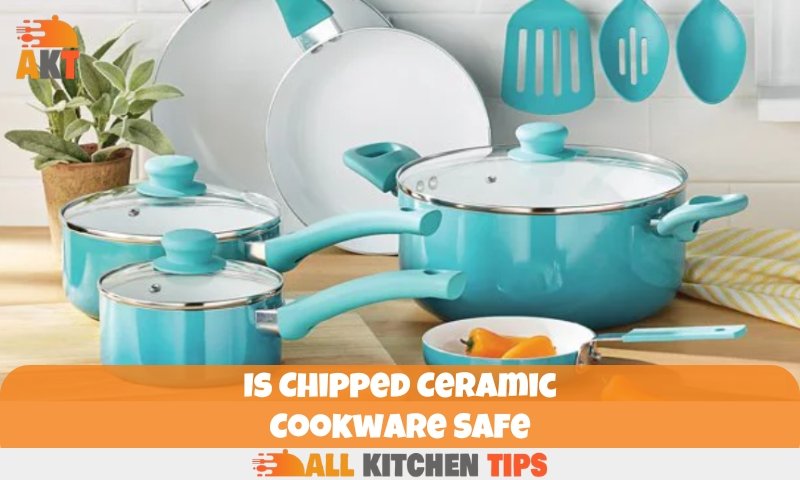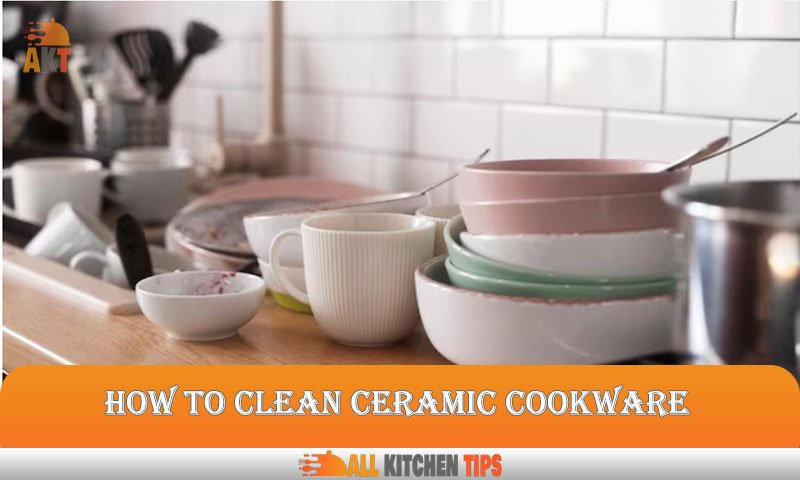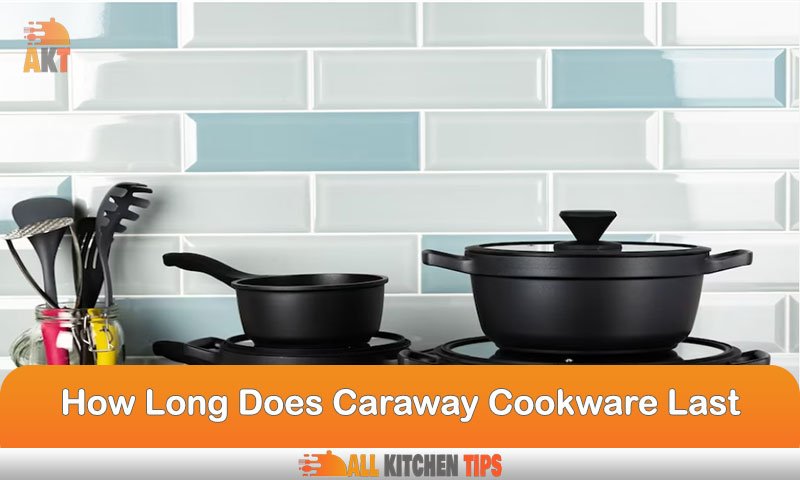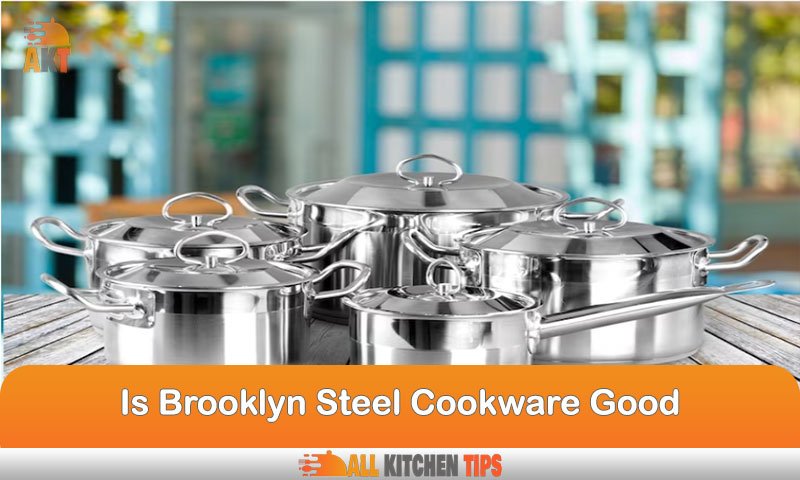Chipped ceramic cookware is not safe for use due to potential lead and other toxic chemicals leaching into food. Ceramic cookware has become a popular choice among people looking for safer and healthier alternatives to non-stick cookware, but chipping can compromise this safety.
Ceramic cookware with a damaged or chipped glaze can expose certain chemicals to your food, potentially causing health issues. Lead is a particular concern with chipped ceramic cookware, especially if the cookware is made in a non-regulated region. Additionally, ceramic cookware is prone to chipping, especially when exposed to sudden temperature changes.
It is important to properly care for your ceramic cookware to ensure safety and longevity.
What Is Ceramic Cookware?

Is Chipped Ceramic Cookware Safe?
Ceramic cookware is a popular choice among home cooks and professional chefs alike due to its nonstick properties and stylish appearance. But with chipping being a common issue, you may wonder if chipped ceramic cookware is safe to use. We will explore the ins and outs of ceramic cookware to determine its safety.
Introduction To Ceramic Cookware
Cooking with ceramic materials is nothing new. It’s been around for centuries. Ceramic cookware is made by firing clay in a kiln at high temperatures, resulting in a hard, non-porous surface that is both scratch and heat-resistant.
Types Of Ceramic Cookware
There are two types of ceramic cookware available on the market: pure ceramic and ceramic-coated.
Pure ceramic cookware is made solely of ceramic material and is usually more expensive. It is known for its excellent heat distribution and cooking efficiency and is safe to use.
Ceramic-coated cookware has a layer of ceramic coating on the surface, making it more affordable but also more prone to chipping.
Characteristics Of Ceramic Cookware
Ceramic cookware has several unique properties that set it apart from its metal counterparts. Here are some key characteristics:
- Non-reactive – doesn’t react with acidic ingredients like tomatoes or vinegar, making it ideal for cooking a wide variety of dishes.
- Non-stick – ceramic cookware is naturally non-stick, making cleaning and cooking a breeze.
- Stylish design – ceramic cookware is available in various colors and designs, making it perfect for the kitchen.
Why Ceramic Cookware Is Popular
Ceramic cookware has quickly become one of the most popular choices and for good reason. Here are some unique benefits of using ceramic cookware:
- Safe – ceramic cookware is non-reactive, making it ideal for cooking acidic dishes without any health concerns.
- Healthy cooking option – unlike traditional metal cookware, ceramic cookware doesn’t leach chemicals into your food.
- Durability – ceramic cookware is long-lasting and can withstand a fair amount of heat.
Health Impact Of Ceramic Cookware
Ceramic cookware is a popular choice among the health-conscious and for good reason. Here are some health benefits of using ceramic cookware:
- Chemical-free – ceramic cookware is free from harmful chemicals and toxins that can be found in other cookware materials.
- Healthier cooking – ceramic cookware doesn’t require the use of oil or butter, making it perfect for those watching their fat intake.
- Non-reactive – ceramic cookware is versatile and can be used to cook a variety of dishes without the risk of the cookware reacting with the food.
Ceramic cookware is a safe, healthy, and durable choice for any kitchen. However, it’s important to note that chipped ceramic cookware should not be used, as it can potentially release harmful chemicals into your food. If your ceramic cookware is chipped, it’s time to replace it with a new one.
How Does Ceramic Cookware Chip?
Is chipped ceramic cookware safe to use? This is a common question that many people ask, and rightfully so. Ceramic cookware is a popular choice among health-conscious individuals due to its non-stick surface and ability to distribute heat evenly. However, like any other cookware, ceramic pots and pans can chip over time.
In this section, we will explore the causes of chipping, the chipping process, the types of chipping, and whether or not chipped ceramic cookware is safe to use.
Explanation Of Ceramic Cookware Chipping
Ceramic cookware is made of clay that is fired at high temperatures and coated with a non-stick surface. While ceramic cookware can withstand high temperatures and is generally durable, it can still chip over time due to a variety of reasons.
Types Of Chipping
There are two types of ceramic cookware chipping: primary and secondary chipping.
Primary chipping occurs when the ceramic coating of the cookware chips, exposing the clay base. This type of chipping can happen due to thermal shock, such as heating or cooling the cookware too rapidly, or physical damage, such as dropping the cookware.
Secondary chipping, on the other hand, occurs when the glaze on the ceramic cookware chips. This can happen due to regular use and cleaning, as well as the use of abrasive cleaning materials.
Causes Of Chipping
There are several causes of chipping in ceramic cookware:
- Physical damage from dropping or scratching the surface with metal utensils
- Thermal shock from exposing hot or cold cookware to extreme temperature changes
- Use of abrasive cleaning materials such as steel wool or scouring pads
- Natural wear and tear from regular use
While chipping may occur as a natural part of the cookware’s lifecycle, it is important to practice proper care and maintenance to minimize the risk.
Chipped ceramic cookware may not be safe to use, depending on the extent of the damage. While primary chipping may lead to potential health risks, secondary chipping may be less harmful. It is essential to take care of your ceramic cookware by handling it with care, cleaning it properly, and not exposing it to extreme temperature changes.
By doing so, you can enjoy your cookware safely for years to come.
Is Chipped Ceramic Cookware Safe To Use?

Ceramic cookware is trending in modern kitchens due to its non-stick surface and aesthetic appeal. However, it’s common to see chipped or cracked ceramic cookware in most households. The question is, is it safe to use chipped ceramic cookware, and if not, then what are the dangers?
Dangers Of Using Chipped Ceramic Cookware
Despite the numerous benefits of ceramic cookware, chipped ceramic cookware poses serious risks to your health. Here are some dangers of using chipped ceramic cookware:
- Increased exposure to toxic metals – cooking with chipped ceramic cookware increases the chances of lead and cadmium leaching into your food. If ingested, these toxic metals can cause serious health problems such as anemia, kidney damage, and even death.
- Affects food quality – when ceramic cookware chips, it creates rough surfaces on the cooking surface, which can result in uneven cooking. Additionally, chipped ceramic cookware can harbor bacteria that can contaminate your food.
How Chipped Ceramic Can Affect Your Health
Chipped ceramic cookware can affect your health in several ways, which include:
- Lead poisoning – lead is a toxic metal that has no safe exposure level and can cause serious health problems. If you’re exposed to lead through chipped ceramic cookware, it can accumulate in your body and cause lead poisoning over time.
- Cadmium poisoning – cadmium is a carcinogenic metal that can also accumulate in your body over time. If ingested, it can cause serious health problems like cancer.
When to Replace Ceramic Cookware?
Knowing when to replace your chipped ceramic cookware is crucial to avoiding serious health problems. You should replace your ceramic cookware if:
- It has a major chip or cracks – major chips or cracks expose your food to toxic metals, making it unsafe to use.
- Its non-stick coating is peeling off – a peeling non-stick coating indicates that the ceramic cookware is no longer safe to use since it can expose your food to toxic metals.
Using chipped ceramic cookware is not safe due to the dangers it poses to your health. Consider replacing your chipped ceramic cookware or repairing minor chips and scratches to eliminate the risks associated with toxic metal exposure. Remember that your safety comes first when it comes to cooking!
How To Properly Use And Maintain Ceramic Cookware
Chipped ceramic cookware can pose a potential health hazard. Whether it’s a hairline crack or a small chip, these imperfections can expose food to toxic glazes or heavy metals that lurk in ceramic pots. So, is chipped ceramic cookware safe?
In this post, we’ll investigate this question and discuss ways to avoid chipping and maximize the lifespan of your ceramic cookware.
Tips For Using Ceramic Cookware
When used correctly, ceramic cookware can be a safe and healthy option for cooking. Here are some tips on how to properly use ceramic cookware:
- To ensure even heat distribution, always use low or medium heat settings when cooking with ceramic cookware.
- Avoid using metal utensils, as they may scratch or damage the ceramic coating. Instead, use silicone, wooden, or other soft utensils to stir and mix your food.
- Always check the manufacturer’s instructions before using ceramic cookware in the oven, microwave, or dishwasher.
- Don’t preheat the pan on high heat for too long. Allow it to gradually heat up before adding the food.
Cleaning Ceramic Cookware
Cleaning your ceramic cookware may seem like a daunting task, but it is quite simple. Follow these tips to keep your pots and pans clean and well-maintained:
- Hand washes your ceramic cookware using gentle dish soap and a soft sponge or cloth. Avoid using abrasive cleaners or scrubbers, as they may scratch the surface of your pots and pans.
- Soak the cookware in warm water with a bit of dish soap to loosen any food residue before washing.
- Do not stack your ceramic cookware when storing it, as this might cause chips and scratches.
Maintenance Of Ceramic Cookware
Maintaining your ceramic cookware involves more than just cleaning it. Follow these tips to keep your cookware in good shape:
- Always let your pans cool down before washing them or exposing them to cold temperatures. Rapid temperature changes can cause cracking or chipping.
- Store your pans in a dry, clean place. Don’t stack them on top of each other.
- Avoid using cookware with deep chips or cracks due to toxic health risks.
Avoiding Chipping Of Ceramic Cookware
Now that you know the risks posed by chipped ceramic cookware, it’s important to take steps to prevent chipping from happening. Here are some tips to avoid chipping your ceramic cookware:
- Use a non-metallic scrubber when cleaning ceramic cookware.
- Always cook on medium or low heat settings to avoid thermal shocks.
- Avoid using harsh chemicals or abrasive cleaning products.
- Avoid dropping or hitting your ceramic cookware.
- Avoid sudden temperature changes.
Maximizing The Lifespan Of Ceramic Cookware
Ceramic cookware can serve you for a long time if properly cared for. Here are some tips to maximize the average lifespan of your ceramic pot:
- Avoid overheating or preheating it for too long.
- Avoid exposing it to extreme temperature fluctuations.
- Do not stack it with other cookware that might cause scratches or damage.
- Follow the manufacturer’s instructions for proper handling and maintenance.
By adopting these simple practices, you can ensure the safety and longevity of your ceramic cookware. With care and attention, it can provide a safe, healthy, and chemical-free option for cooking your favorite meals.
Alternatives To Ceramic Cookware
Chipped ceramic cookware can be a nuisance in the kitchen. Not only does it look unsightly, but it can also affect the safety of the food you serve your family. If you’re looking for an alternative to ceramic cookware, you have several fantastic options available.
Keep reading to discover the best alternative materials that are safe, affordable, and easy to take care of for everyday use.
Comparison With Other Cookware Materials
When you’re in the market for new cookware, you should know that although chipped ceramic cookware is a popular choice, there are other superior alternatives that you can invest in. We compare chipped ceramic cookware to the following materials:
Cast Iron
Cast iron cookware is an excellent replacement for chipped ceramic cookware because it requires low maintenance, is durable, and heats up evenly. Additionally, it can withstand high temperatures without damaging the cooking surface. Although it may be heavy, it is a great investment due to its durability, low maintenance, and excellent heat retention properties.
Stainless Steel
Mastering the art of cooking with stainless steel cookware is not as intimidating as it seems. It has a polished surface and is easy to clean. It’s also affordable and durable; however, stainless steel is a poor heat conductor and takes a while to heat up, leading to hot spots.
Anodized Aluminum
Anodized aluminum is currently a top-rated cookware material and one of the most reliable alternatives to chipped ceramic cookware. Anodized aluminum is non-reactive, doesn’t react to acidic foods, and heats up evenly. It’s also lightweight, making it a good portable option for chefs who need cookware for on-the-go cooking.
FAQs
Is Chipped Ceramic Cookware Safe To Use?
Cooking with chipped ceramic cookware is not recommended, as it can release harmful chemicals.
Can Chipped Ceramic Cookware Cause Health Problems?
Yes, chipped ceramic cookware can cause health problems as the chips can release toxic elements.
Can I Fix Chipped Ceramic Cookware?
It is not recommended to fix chipped ceramic cookware. Replace it to avoid health hazards.
Conclusion
Based on the information at hand, chipped ceramic cookware is generally considered safe to use. However, it’s important to assess the severity of the chip and the potential risks associated with continued use. If the chip isn’t too deep and hasn’t affected the non-stick coating, it’s probably fine to continue cooking with the dish.
But if the chip is significant or has caused the non-stick coating to peel off, it’s best to replace the cookware to avoid any potential health risks. Additionally, it’s worth noting that ceramic cookware is generally considered a safe and healthy choice due to its non-toxic and non-reactive properties.
Overall, while it’s important to be cautious about chipped ceramic cookware, as long as you take appropriate safety measures, there’s no reason to be overly concerned about its safety.





